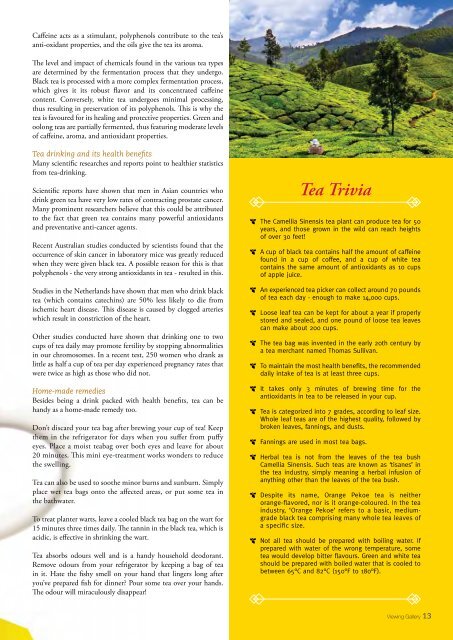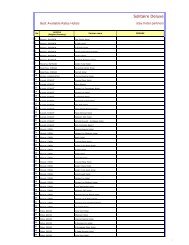SRI LANKA SRI LANKA - QVI Club
SRI LANKA SRI LANKA - QVI Club
SRI LANKA SRI LANKA - QVI Club
Create successful ePaper yourself
Turn your PDF publications into a flip-book with our unique Google optimized e-Paper software.
Caffeine acts as a stimulant, polyphenols contribute to the tea’s<br />
anti-oxidant properties, and the oils give the tea its aroma.<br />
The level and impact of chemicals found in the various tea types<br />
are determined by the fermentation process that they undergo.<br />
Black tea is processed with a more complex fermentation process,<br />
which gives it its robust flavor and its concentrated caffeine<br />
content. Conversely, white tea undergoes minimal processing,<br />
thus resulting in preservation of its polyphenols. This is why the<br />
tea is favoured for its healing and protective properties. Green and<br />
oolong teas are partially fermented, thus featuring moderate levels<br />
of caffeine, aroma, and antioxidant properties.<br />
Tea drinking and its health benefits<br />
Many scientific researches and reports point to healthier statistics<br />
from tea-drinking.<br />
Scientific reports have shown that men in Asian countries who<br />
drink green tea have very low rates of contracting prostate cancer.<br />
Many prominent researchers believe that this could be attributed<br />
to the fact that green tea contains many powerful antioxidants<br />
and preventative anti-cancer agents.<br />
Recent Australian studies conducted by scientists found that the<br />
occurrence of skin cancer in laboratory mice was greatly reduced<br />
when they were given black tea. A possible reason for this is that<br />
polyphenols - the very strong antioxidants in tea - resulted in this.<br />
Studies in the Netherlands have shown that men who drink black<br />
tea (which contains catechins) are 50% less likely to die from<br />
ischemic heart disease. This disease is caused by clogged arteries<br />
which result in constriction of the heart.<br />
Other studies conducted have shown that drinking one to two<br />
cups of tea daily may promote fertility by stopping abnormalities<br />
in our chromosomes. In a recent test, 250 women who drank as<br />
little as half a cup of tea per day experienced pregnancy rates that<br />
were twice as high as those who did not.<br />
Home-made remedies<br />
Besides being a drink packed with health benefits, tea can be<br />
handy as a home-made remedy too.<br />
Don’t discard your tea bag after brewing your cup of tea! Keep<br />
them in the refrigerator for days when you suffer from puffy<br />
eyes. Place a moist teabag over both eyes and leave for about<br />
20 minutes. This mini eye-treatment works wonders to reduce<br />
the swelling.<br />
Tea can also be used to soothe minor burns and sunburn. Simply<br />
place wet tea bags onto the affected areas, or put some tea in<br />
the bathwater.<br />
To treat planter warts, leave a cooled black tea bag on the wart for<br />
15 minutes three times daily. The tannin in the black tea, which is<br />
acidic, is effective in shrinking the wart.<br />
Tea absorbs odours well and is a handy household deodorant.<br />
Remove odours from your refrigerator by keeping a bag of tea<br />
in it. Hate the fishy smell on your hand that lingers long after<br />
you’ve prepared fish for dinner? Pour some tea over your hands.<br />
The odour will miraculously disappear!<br />
Tea Trivia<br />
G The Camellia Sinensis tea plant can produce tea for 50<br />
years, and those grown in the wild can reach heights<br />
of over 30 feet!<br />
G A cup of black tea contains half the amount of caffeine<br />
found in a cup of coffee, and a cup of white tea<br />
contains the same amount of antioxidants as 10 cups<br />
of apple juice.<br />
G An experienced tea picker can collect around 70 pounds<br />
of tea each day - enough to make 14,000 cups.<br />
G Loose leaf tea can be kept for about a year if properly<br />
stored and sealed, and one pound of loose tea leaves<br />
can make about 200 cups.<br />
G The tea bag was invented in the early 20th century by<br />
a tea merchant named Thomas Sullivan.<br />
G To maintain the most health benefits, the recommended<br />
daily intake of tea is at least three cups.<br />
G It takes only 3 minutes of brewing time for the<br />
antioxidants in tea to be released in your cup.<br />
G Tea is categorized into 7 grades, according to leaf size.<br />
Whole leaf teas are of the highest quality, followed by<br />
broken leaves, fannings, and dusts.<br />
G Fannings are used in most tea bags.<br />
G Herbal tea is not from the leaves of the tea bush<br />
Camellia Sinensis. Such teas are known as ‘tisanes’ in<br />
the tea industry, simply meaning a herbal infusion of<br />
anything other than the leaves of the tea bush.<br />
G Despite its name, Orange Pekoe tea is neither<br />
orange-flavored, nor is it orange-coloured. In the tea<br />
industry, ‘Orange Pekoe’ refers to a basic, mediumgrade<br />
black tea comprising many whole tea leaves of<br />
a specific size.<br />
G Not all tea should be prepared with boiling water. If<br />
prepared with water of the wrong temperature, some<br />
tea would develop bitter flavours. Green and white tea<br />
should be prepared with boiled water that is cooled to<br />
between 65°C and 82°C (150°F to 180°F).<br />
Viewing Gallery 13











